Law 0115: Contract Law Elements and Case Study of Safe Bank Ltd
VerifiedAdded on 2023/06/10
|7
|1619
|420
Report
AI Summary
This business law assignment provides a comprehensive overview of contract law, defining a contract and elaborating on the essential elements required for its formation, including offer, acceptance, consideration, and intention to create legal relations. It further analyzes two case scenarios involving Safe Bank Ltd (SB) to determine the existence of valid contracts. The first scenario examines interactions between SB and All Gifts Pte Ltd (AG), focusing on counter-offers and acceptance. The second scenario assesses a potential contract between SB and Perfect Gifts Pte Ltd (PG), considering the application of postal rules. The assignment concludes that no contract existed between SB and AG due to a lack of acceptance of the counter-offer, while a valid contract was formed between SB and PG based on the postal rule, implying SB cannot terminate the order with PG. The assignment references relevant legal cases and the Electronic Transactions Act 2010 to support its analysis.
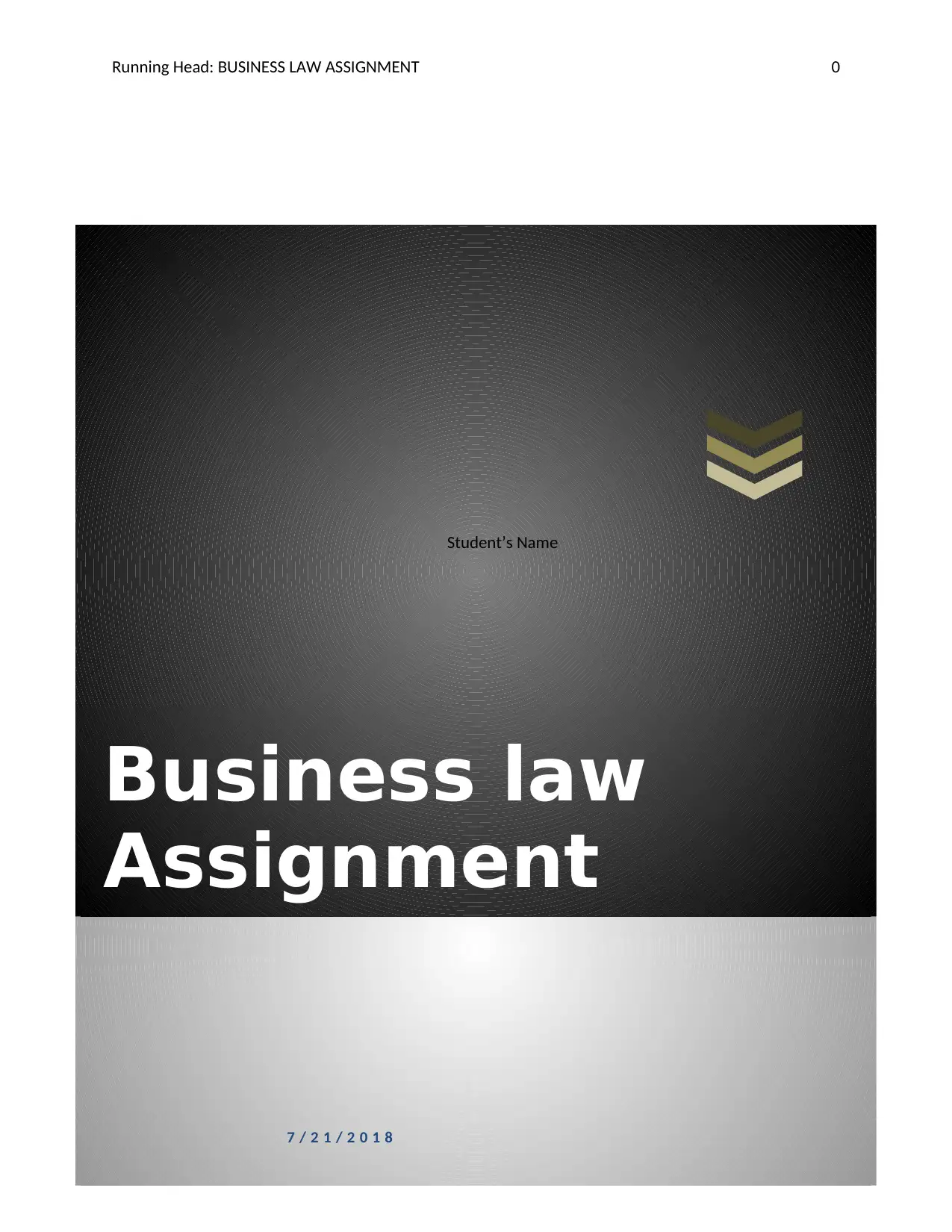
Business law
Assignment
Running Head: BUSINESS LAW ASSIGNMENT 0
7 / 2 1 / 2 0 1 8
Student’s Name
Assignment
Running Head: BUSINESS LAW ASSIGNMENT 0
7 / 2 1 / 2 0 1 8
Student’s Name
Paraphrase This Document
Need a fresh take? Get an instant paraphrase of this document with our AI Paraphraser
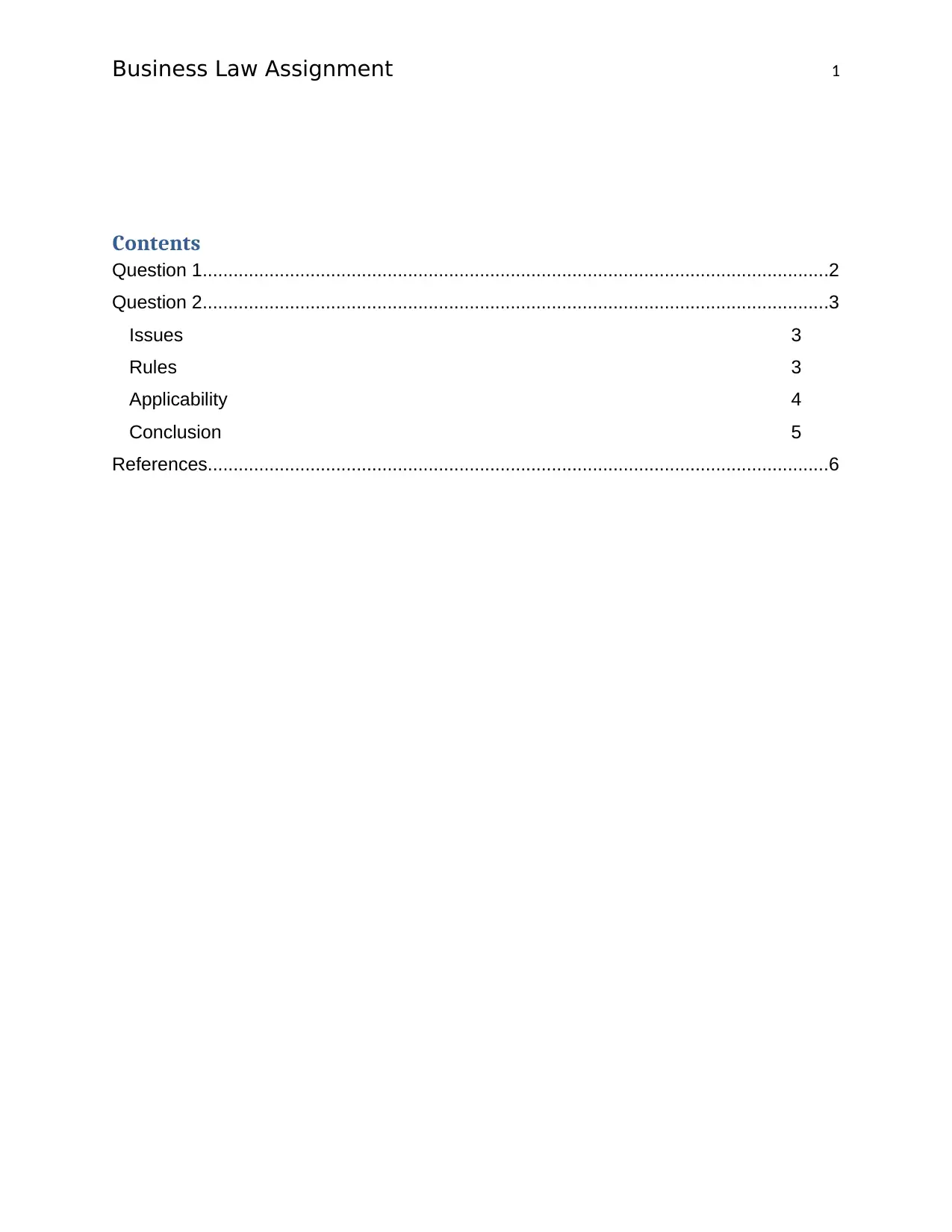
Business Law Assignment 1
Contents
Question 1..........................................................................................................................2
Question 2..........................................................................................................................3
Issues 3
Rules 3
Applicability 4
Conclusion 5
References.........................................................................................................................6
Contents
Question 1..........................................................................................................................2
Question 2..........................................................................................................................3
Issues 3
Rules 3
Applicability 4
Conclusion 5
References.........................................................................................................................6
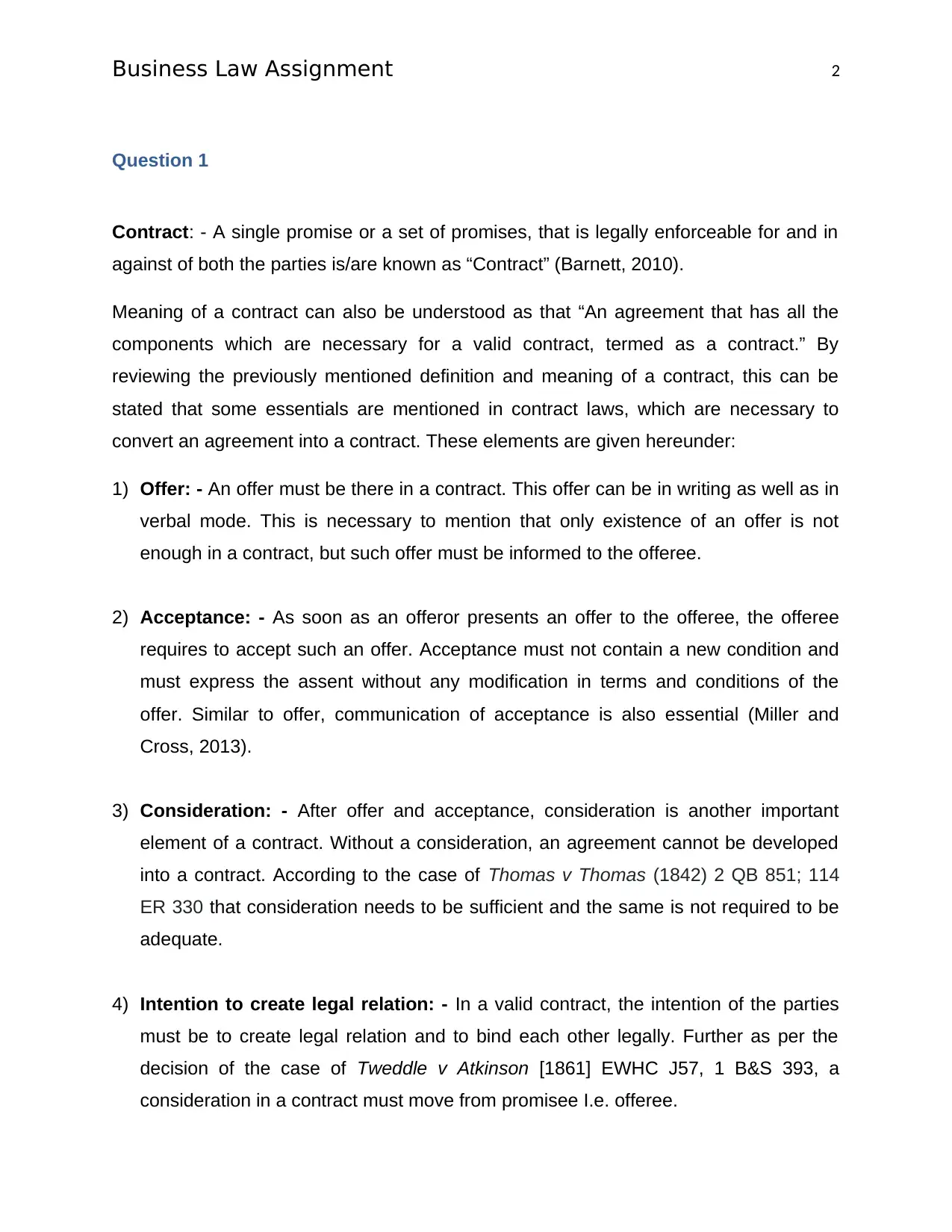
Business Law Assignment 2
Question 1
Contract: - A single promise or a set of promises, that is legally enforceable for and in
against of both the parties is/are known as “Contract” (Barnett, 2010).
Meaning of a contract can also be understood as that “An agreement that has all the
components which are necessary for a valid contract, termed as a contract.” By
reviewing the previously mentioned definition and meaning of a contract, this can be
stated that some essentials are mentioned in contract laws, which are necessary to
convert an agreement into a contract. These elements are given hereunder:
1) Offer: - An offer must be there in a contract. This offer can be in writing as well as in
verbal mode. This is necessary to mention that only existence of an offer is not
enough in a contract, but such offer must be informed to the offeree.
2) Acceptance: - As soon as an offeror presents an offer to the offeree, the offeree
requires to accept such an offer. Acceptance must not contain a new condition and
must express the assent without any modification in terms and conditions of the
offer. Similar to offer, communication of acceptance is also essential (Miller and
Cross, 2013).
3) Consideration: - After offer and acceptance, consideration is another important
element of a contract. Without a consideration, an agreement cannot be developed
into a contract. According to the case of Thomas v Thomas (1842) 2 QB 851; 114
ER 330 that consideration needs to be sufficient and the same is not required to be
adequate.
4) Intention to create legal relation: - In a valid contract, the intention of the parties
must be to create legal relation and to bind each other legally. Further as per the
decision of the case of Tweddle v Atkinson [1861] EWHC J57, 1 B&S 393, a
consideration in a contract must move from promisee I.e. offeree.
Question 1
Contract: - A single promise or a set of promises, that is legally enforceable for and in
against of both the parties is/are known as “Contract” (Barnett, 2010).
Meaning of a contract can also be understood as that “An agreement that has all the
components which are necessary for a valid contract, termed as a contract.” By
reviewing the previously mentioned definition and meaning of a contract, this can be
stated that some essentials are mentioned in contract laws, which are necessary to
convert an agreement into a contract. These elements are given hereunder:
1) Offer: - An offer must be there in a contract. This offer can be in writing as well as in
verbal mode. This is necessary to mention that only existence of an offer is not
enough in a contract, but such offer must be informed to the offeree.
2) Acceptance: - As soon as an offeror presents an offer to the offeree, the offeree
requires to accept such an offer. Acceptance must not contain a new condition and
must express the assent without any modification in terms and conditions of the
offer. Similar to offer, communication of acceptance is also essential (Miller and
Cross, 2013).
3) Consideration: - After offer and acceptance, consideration is another important
element of a contract. Without a consideration, an agreement cannot be developed
into a contract. According to the case of Thomas v Thomas (1842) 2 QB 851; 114
ER 330 that consideration needs to be sufficient and the same is not required to be
adequate.
4) Intention to create legal relation: - In a valid contract, the intention of the parties
must be to create legal relation and to bind each other legally. Further as per the
decision of the case of Tweddle v Atkinson [1861] EWHC J57, 1 B&S 393, a
consideration in a contract must move from promisee I.e. offeree.
⊘ This is a preview!⊘
Do you want full access?
Subscribe today to unlock all pages.

Trusted by 1+ million students worldwide
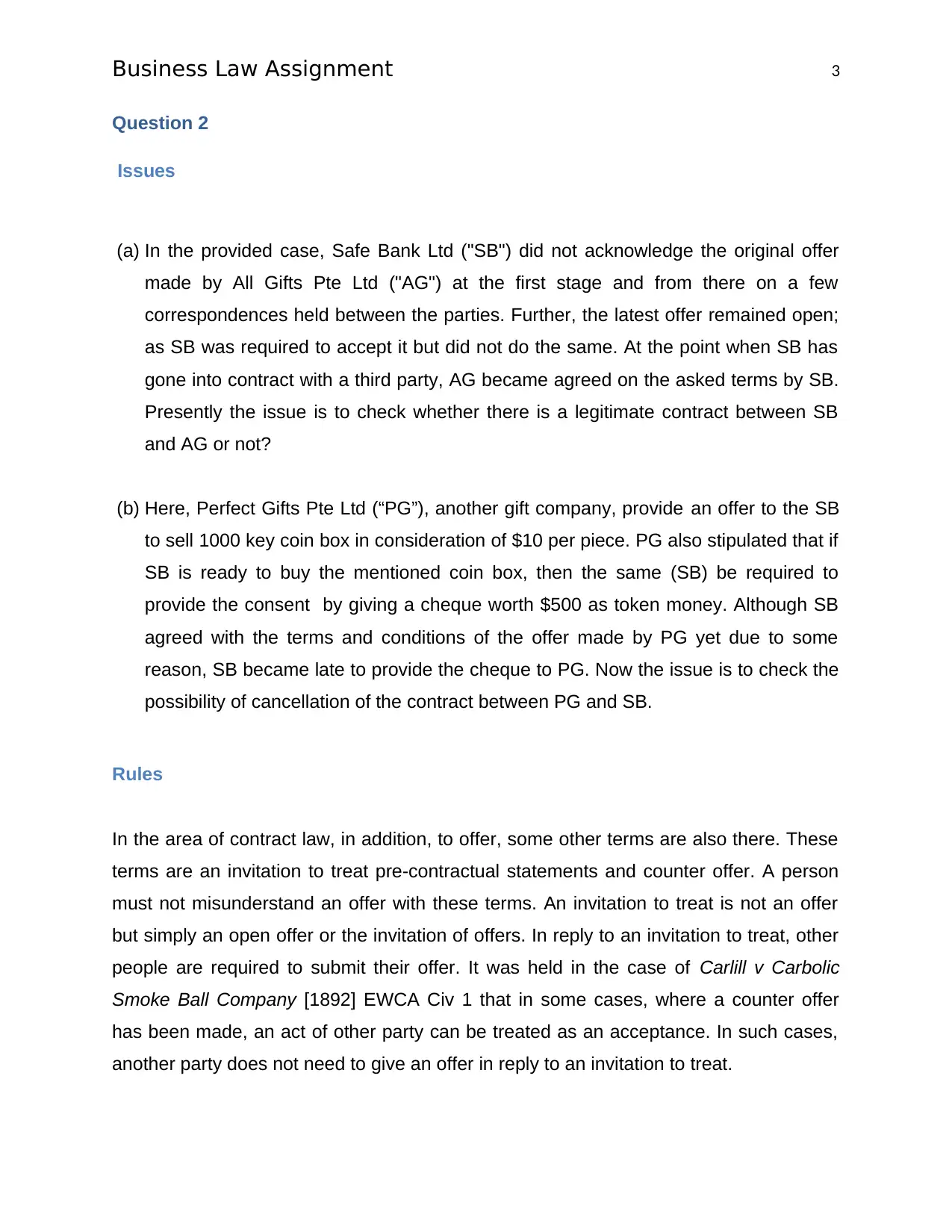
Business Law Assignment 3
Question 2
Issues
(a) In the provided case, Safe Bank Ltd ("SB") did not acknowledge the original offer
made by All Gifts Pte Ltd ("AG") at the first stage and from there on a few
correspondences held between the parties. Further, the latest offer remained open;
as SB was required to accept it but did not do the same. At the point when SB has
gone into contract with a third party, AG became agreed on the asked terms by SB.
Presently the issue is to check whether there is a legitimate contract between SB
and AG or not?
(b) Here, Perfect Gifts Pte Ltd (“PG”), another gift company, provide an offer to the SB
to sell 1000 key coin box in consideration of $10 per piece. PG also stipulated that if
SB is ready to buy the mentioned coin box, then the same (SB) be required to
provide the consent by giving a cheque worth $500 as token money. Although SB
agreed with the terms and conditions of the offer made by PG yet due to some
reason, SB became late to provide the cheque to PG. Now the issue is to check the
possibility of cancellation of the contract between PG and SB.
Rules
In the area of contract law, in addition, to offer, some other terms are also there. These
terms are an invitation to treat pre-contractual statements and counter offer. A person
must not misunderstand an offer with these terms. An invitation to treat is not an offer
but simply an open offer or the invitation of offers. In reply to an invitation to treat, other
people are required to submit their offer. It was held in the case of Carlill v Carbolic
Smoke Ball Company [1892] EWCA Civ 1 that in some cases, where a counter offer
has been made, an act of other party can be treated as an acceptance. In such cases,
another party does not need to give an offer in reply to an invitation to treat.
Question 2
Issues
(a) In the provided case, Safe Bank Ltd ("SB") did not acknowledge the original offer
made by All Gifts Pte Ltd ("AG") at the first stage and from there on a few
correspondences held between the parties. Further, the latest offer remained open;
as SB was required to accept it but did not do the same. At the point when SB has
gone into contract with a third party, AG became agreed on the asked terms by SB.
Presently the issue is to check whether there is a legitimate contract between SB
and AG or not?
(b) Here, Perfect Gifts Pte Ltd (“PG”), another gift company, provide an offer to the SB
to sell 1000 key coin box in consideration of $10 per piece. PG also stipulated that if
SB is ready to buy the mentioned coin box, then the same (SB) be required to
provide the consent by giving a cheque worth $500 as token money. Although SB
agreed with the terms and conditions of the offer made by PG yet due to some
reason, SB became late to provide the cheque to PG. Now the issue is to check the
possibility of cancellation of the contract between PG and SB.
Rules
In the area of contract law, in addition, to offer, some other terms are also there. These
terms are an invitation to treat pre-contractual statements and counter offer. A person
must not misunderstand an offer with these terms. An invitation to treat is not an offer
but simply an open offer or the invitation of offers. In reply to an invitation to treat, other
people are required to submit their offer. It was held in the case of Carlill v Carbolic
Smoke Ball Company [1892] EWCA Civ 1 that in some cases, where a counter offer
has been made, an act of other party can be treated as an acceptance. In such cases,
another party does not need to give an offer in reply to an invitation to treat.
Paraphrase This Document
Need a fresh take? Get an instant paraphrase of this document with our AI Paraphraser
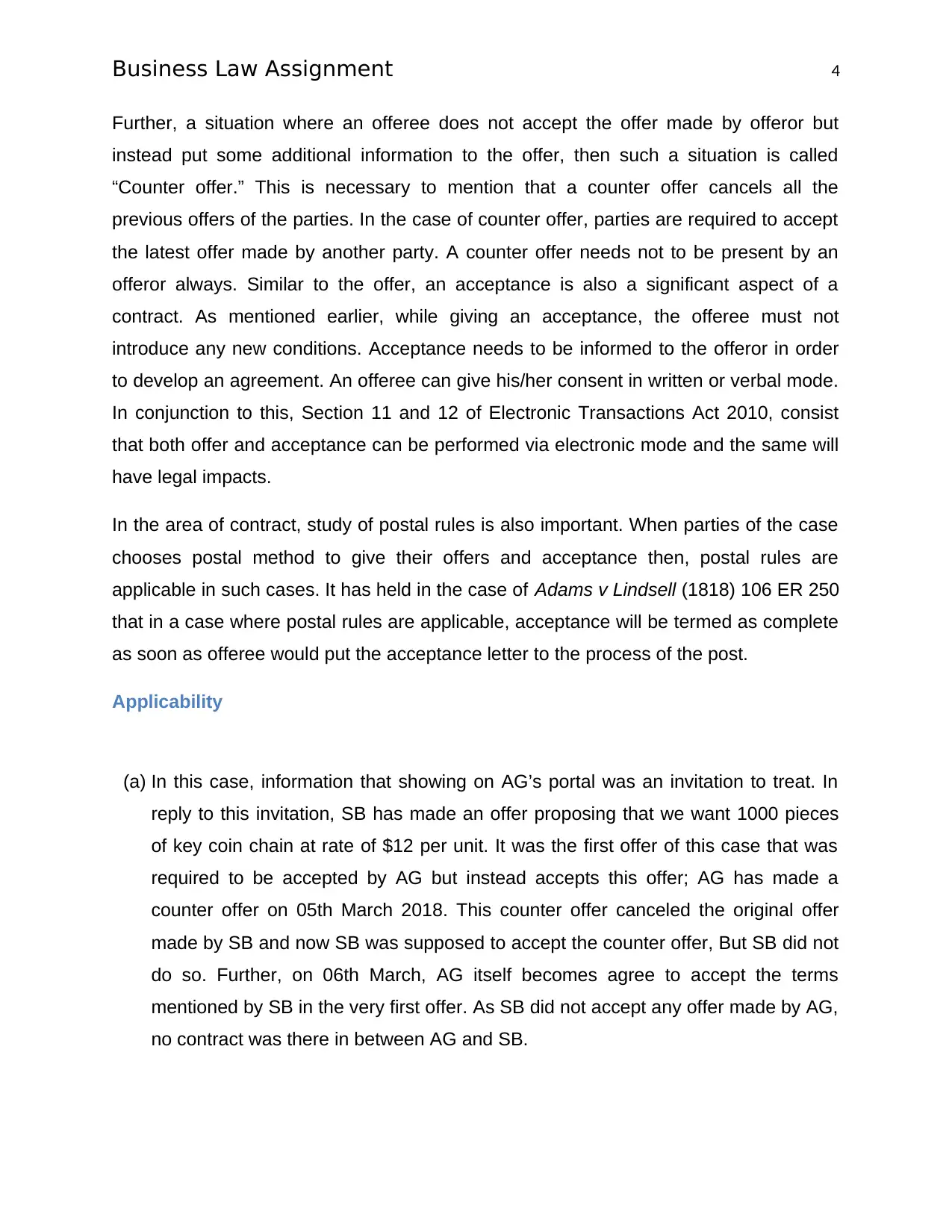
Business Law Assignment 4
Further, a situation where an offeree does not accept the offer made by offeror but
instead put some additional information to the offer, then such a situation is called
“Counter offer.” This is necessary to mention that a counter offer cancels all the
previous offers of the parties. In the case of counter offer, parties are required to accept
the latest offer made by another party. A counter offer needs not to be present by an
offeror always. Similar to the offer, an acceptance is also a significant aspect of a
contract. As mentioned earlier, while giving an acceptance, the offeree must not
introduce any new conditions. Acceptance needs to be informed to the offeror in order
to develop an agreement. An offeree can give his/her consent in written or verbal mode.
In conjunction to this, Section 11 and 12 of Electronic Transactions Act 2010, consist
that both offer and acceptance can be performed via electronic mode and the same will
have legal impacts.
In the area of contract, study of postal rules is also important. When parties of the case
chooses postal method to give their offers and acceptance then, postal rules are
applicable in such cases. It has held in the case of Adams v Lindsell (1818) 106 ER 250
that in a case where postal rules are applicable, acceptance will be termed as complete
as soon as offeree would put the acceptance letter to the process of the post.
Applicability
(a) In this case, information that showing on AG’s portal was an invitation to treat. In
reply to this invitation, SB has made an offer proposing that we want 1000 pieces
of key coin chain at rate of $12 per unit. It was the first offer of this case that was
required to be accepted by AG but instead accepts this offer; AG has made a
counter offer on 05th March 2018. This counter offer canceled the original offer
made by SB and now SB was supposed to accept the counter offer, But SB did not
do so. Further, on 06th March, AG itself becomes agree to accept the terms
mentioned by SB in the very first offer. As SB did not accept any offer made by AG,
no contract was there in between AG and SB.
Further, a situation where an offeree does not accept the offer made by offeror but
instead put some additional information to the offer, then such a situation is called
“Counter offer.” This is necessary to mention that a counter offer cancels all the
previous offers of the parties. In the case of counter offer, parties are required to accept
the latest offer made by another party. A counter offer needs not to be present by an
offeror always. Similar to the offer, an acceptance is also a significant aspect of a
contract. As mentioned earlier, while giving an acceptance, the offeree must not
introduce any new conditions. Acceptance needs to be informed to the offeror in order
to develop an agreement. An offeree can give his/her consent in written or verbal mode.
In conjunction to this, Section 11 and 12 of Electronic Transactions Act 2010, consist
that both offer and acceptance can be performed via electronic mode and the same will
have legal impacts.
In the area of contract, study of postal rules is also important. When parties of the case
chooses postal method to give their offers and acceptance then, postal rules are
applicable in such cases. It has held in the case of Adams v Lindsell (1818) 106 ER 250
that in a case where postal rules are applicable, acceptance will be termed as complete
as soon as offeree would put the acceptance letter to the process of the post.
Applicability
(a) In this case, information that showing on AG’s portal was an invitation to treat. In
reply to this invitation, SB has made an offer proposing that we want 1000 pieces
of key coin chain at rate of $12 per unit. It was the first offer of this case that was
required to be accepted by AG but instead accepts this offer; AG has made a
counter offer on 05th March 2018. This counter offer canceled the original offer
made by SB and now SB was supposed to accept the counter offer, But SB did not
do so. Further, on 06th March, AG itself becomes agree to accept the terms
mentioned by SB in the very first offer. As SB did not accept any offer made by AG,
no contract was there in between AG and SB.
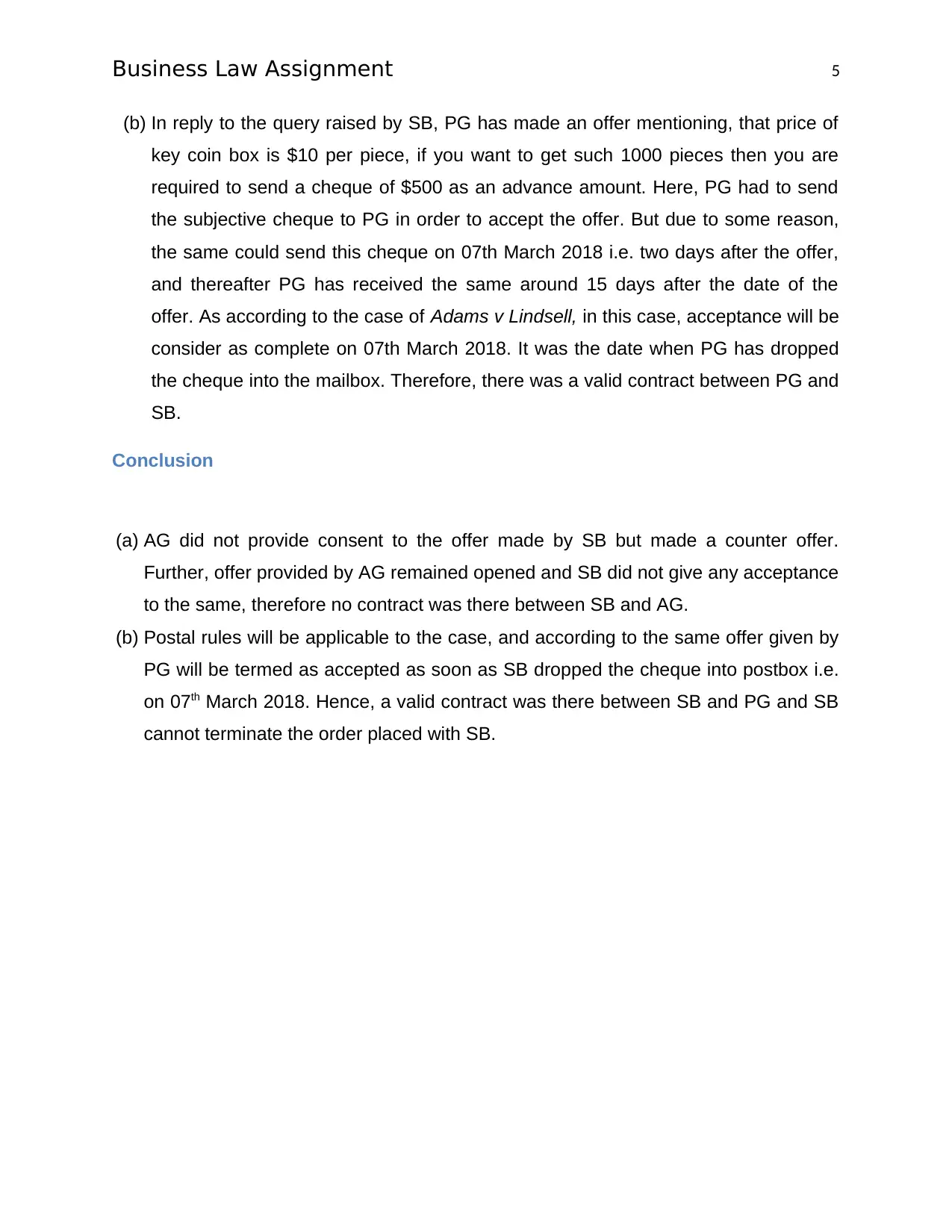
Business Law Assignment 5
(b) In reply to the query raised by SB, PG has made an offer mentioning, that price of
key coin box is $10 per piece, if you want to get such 1000 pieces then you are
required to send a cheque of $500 as an advance amount. Here, PG had to send
the subjective cheque to PG in order to accept the offer. But due to some reason,
the same could send this cheque on 07th March 2018 i.e. two days after the offer,
and thereafter PG has received the same around 15 days after the date of the
offer. As according to the case of Adams v Lindsell, in this case, acceptance will be
consider as complete on 07th March 2018. It was the date when PG has dropped
the cheque into the mailbox. Therefore, there was a valid contract between PG and
SB.
Conclusion
(a) AG did not provide consent to the offer made by SB but made a counter offer.
Further, offer provided by AG remained opened and SB did not give any acceptance
to the same, therefore no contract was there between SB and AG.
(b) Postal rules will be applicable to the case, and according to the same offer given by
PG will be termed as accepted as soon as SB dropped the cheque into postbox i.e.
on 07th March 2018. Hence, a valid contract was there between SB and PG and SB
cannot terminate the order placed with SB.
(b) In reply to the query raised by SB, PG has made an offer mentioning, that price of
key coin box is $10 per piece, if you want to get such 1000 pieces then you are
required to send a cheque of $500 as an advance amount. Here, PG had to send
the subjective cheque to PG in order to accept the offer. But due to some reason,
the same could send this cheque on 07th March 2018 i.e. two days after the offer,
and thereafter PG has received the same around 15 days after the date of the
offer. As according to the case of Adams v Lindsell, in this case, acceptance will be
consider as complete on 07th March 2018. It was the date when PG has dropped
the cheque into the mailbox. Therefore, there was a valid contract between PG and
SB.
Conclusion
(a) AG did not provide consent to the offer made by SB but made a counter offer.
Further, offer provided by AG remained opened and SB did not give any acceptance
to the same, therefore no contract was there between SB and AG.
(b) Postal rules will be applicable to the case, and according to the same offer given by
PG will be termed as accepted as soon as SB dropped the cheque into postbox i.e.
on 07th March 2018. Hence, a valid contract was there between SB and PG and SB
cannot terminate the order placed with SB.
⊘ This is a preview!⊘
Do you want full access?
Subscribe today to unlock all pages.

Trusted by 1+ million students worldwide
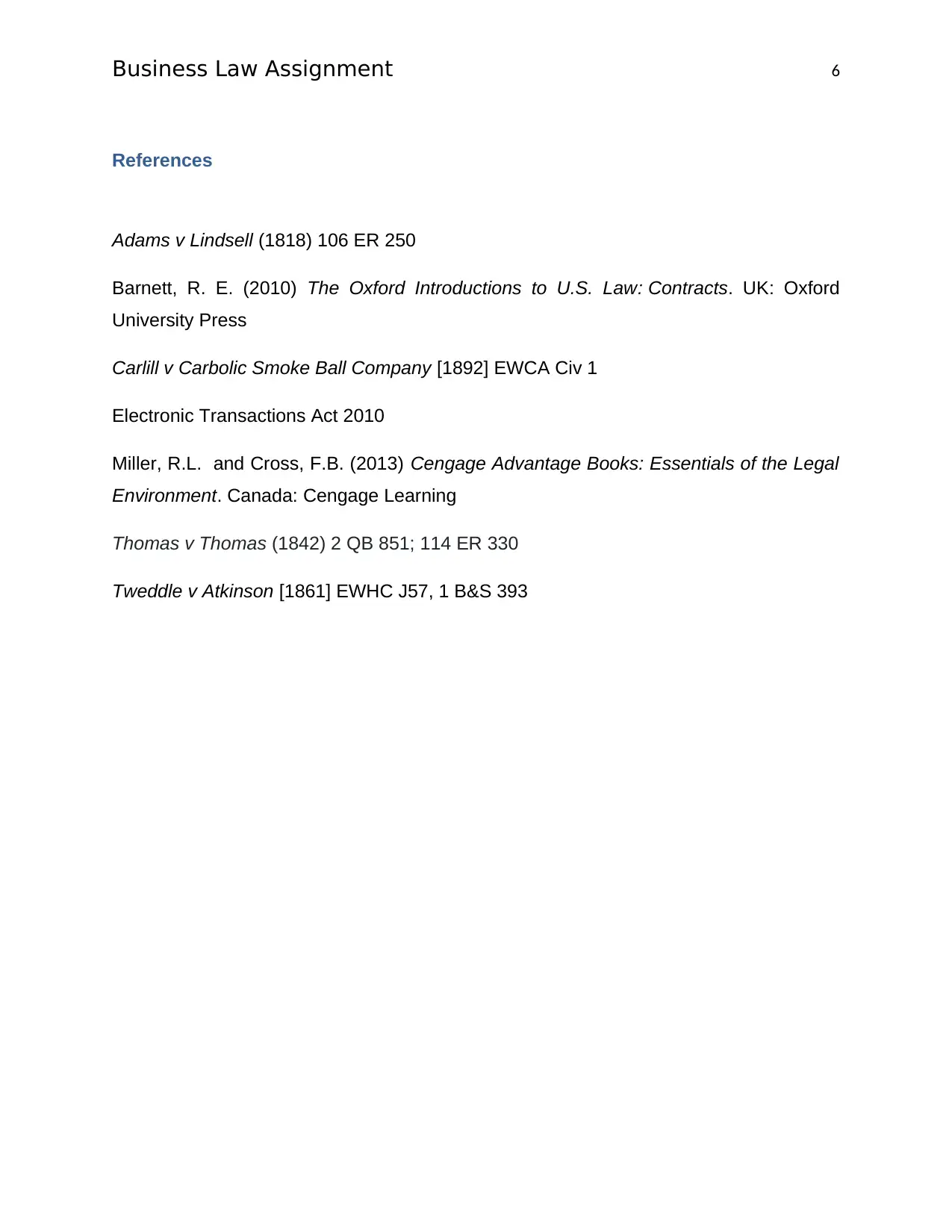
Business Law Assignment 6
References
Adams v Lindsell (1818) 106 ER 250
Barnett, R. E. (2010) The Oxford Introductions to U.S. Law: Contracts. UK: Oxford
University Press
Carlill v Carbolic Smoke Ball Company [1892] EWCA Civ 1
Electronic Transactions Act 2010
Miller, R.L. and Cross, F.B. (2013) Cengage Advantage Books: Essentials of the Legal
Environment. Canada: Cengage Learning
Thomas v Thomas (1842) 2 QB 851; 114 ER 330
Tweddle v Atkinson [1861] EWHC J57, 1 B&S 393
References
Adams v Lindsell (1818) 106 ER 250
Barnett, R. E. (2010) The Oxford Introductions to U.S. Law: Contracts. UK: Oxford
University Press
Carlill v Carbolic Smoke Ball Company [1892] EWCA Civ 1
Electronic Transactions Act 2010
Miller, R.L. and Cross, F.B. (2013) Cengage Advantage Books: Essentials of the Legal
Environment. Canada: Cengage Learning
Thomas v Thomas (1842) 2 QB 851; 114 ER 330
Tweddle v Atkinson [1861] EWHC J57, 1 B&S 393
1 out of 7
Related Documents
Your All-in-One AI-Powered Toolkit for Academic Success.
+13062052269
info@desklib.com
Available 24*7 on WhatsApp / Email
![[object Object]](/_next/static/media/star-bottom.7253800d.svg)
Unlock your academic potential
Copyright © 2020–2025 A2Z Services. All Rights Reserved. Developed and managed by ZUCOL.





